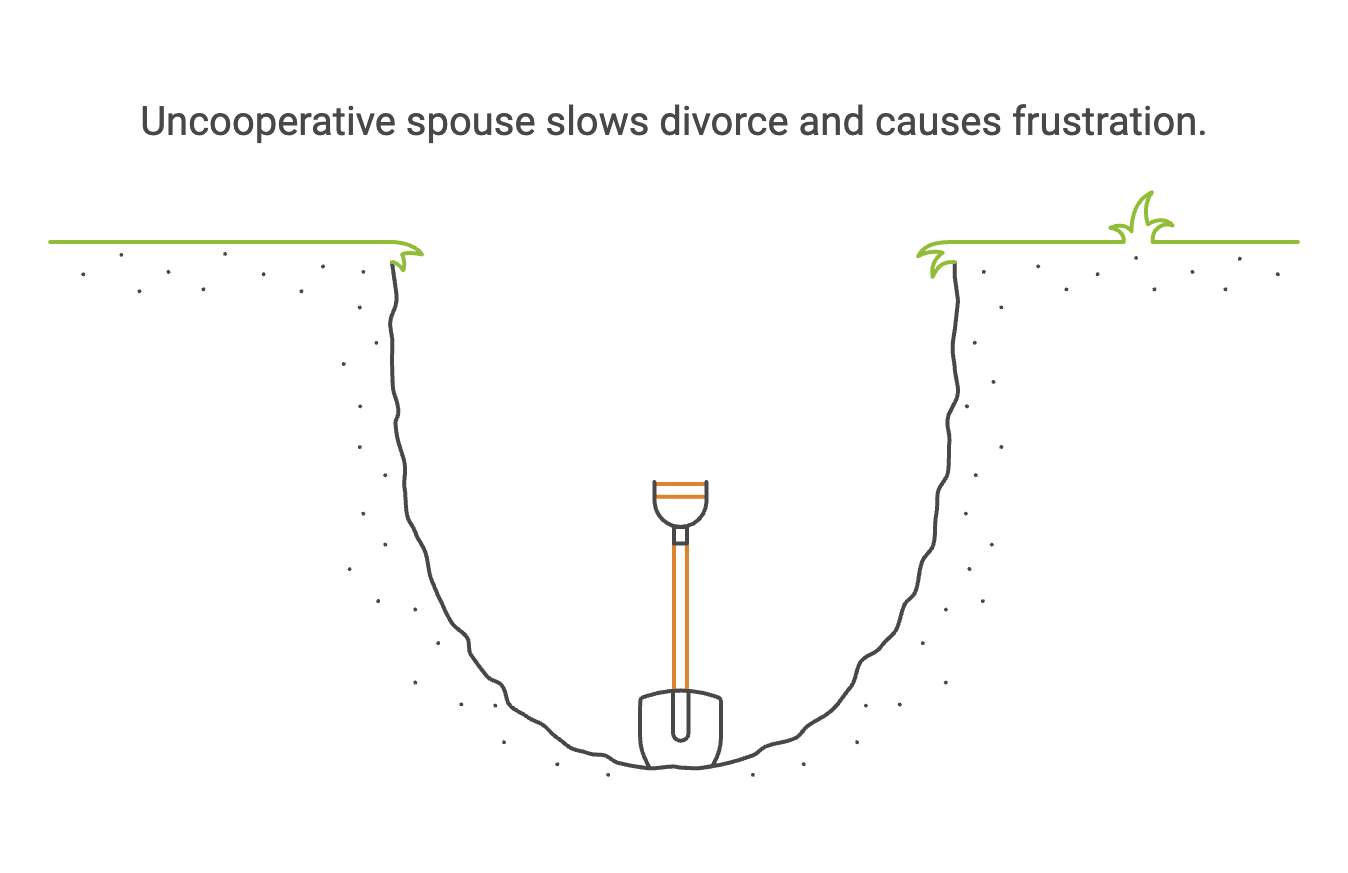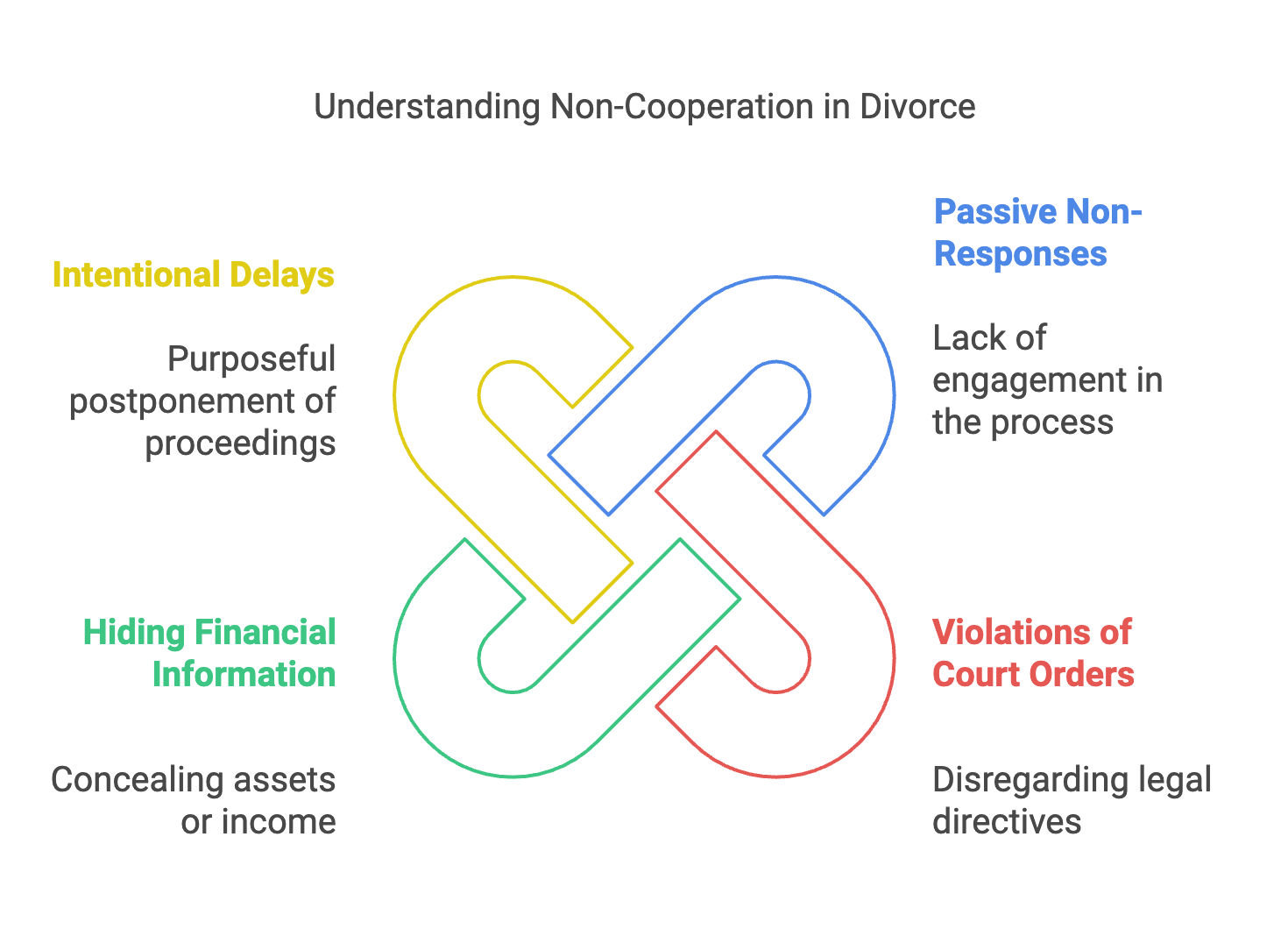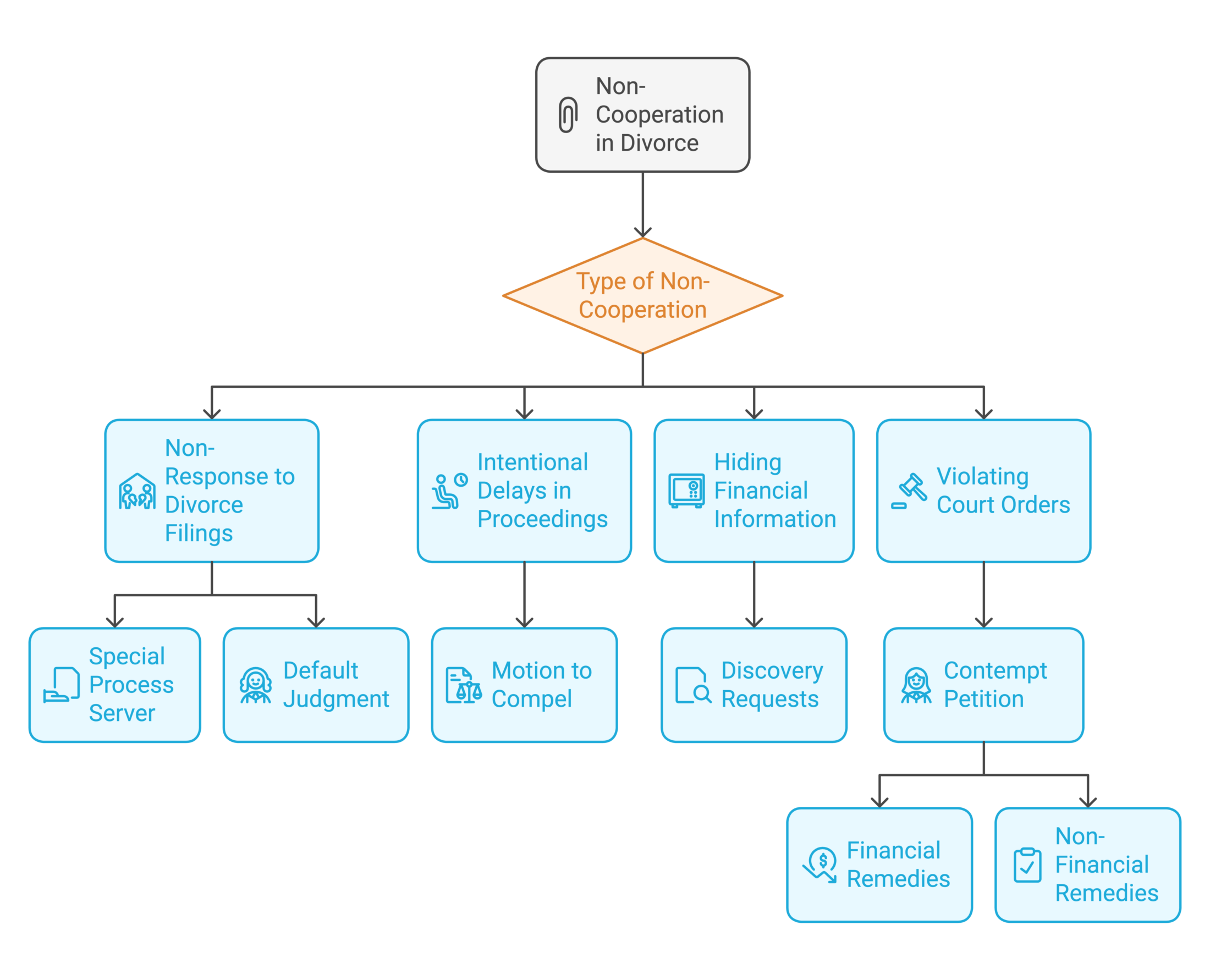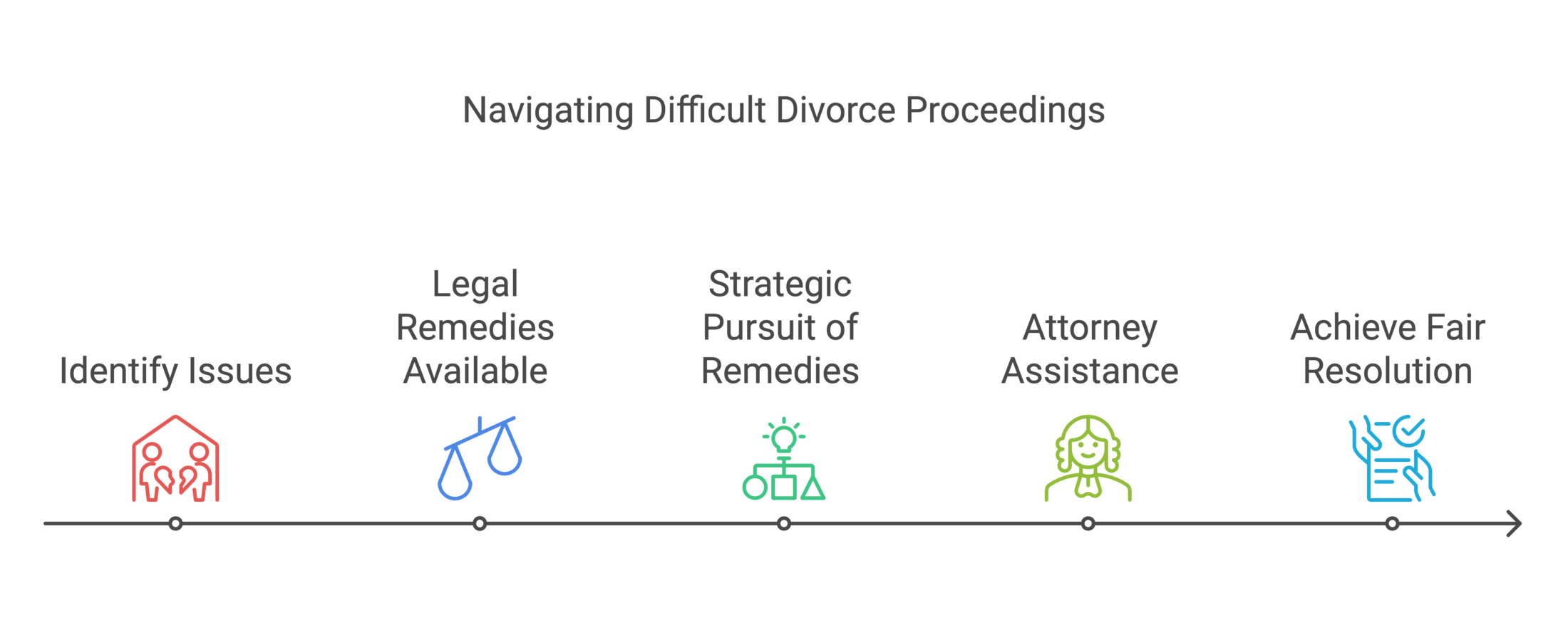Divorce is rarely easy, but dealing with an uncooperative spouse can make it even more stressful. When one spouse refuses to participate in the process, delays proceedings or hides important financial information, it can slow down progress and cause unnecessary frustration. These challenges become even more complicated when co-parenting arrangements are involved.
This article explores common behaviors of an uncooperative spouse during divorce and explains the legal remedies that can help keep your case on track. Whether it’s filing a default judgment, issuing subpoenas, or filing a motion to compel, we outline practical options to address non-cooperation and protect your interests.
What Is Non-Cooperation in Illinois Divorce Cases?
To finalize a divorce, couples must agree on key issues like marital property, bank accounts, retirement plans, and other financial matters. Parents face additional decisions about their children, including custody, education, extracurriculars, health, and religion.
It’s natural for couples to disagree on these topics, and many will spend time negotiating their positions through lawyers. While a long and contentious divorce process is not ideal, disagreeing is not necessarily non-cooperation. Non-cooperation from a spouse in an Illinois divorce can include several behaviors ranging from passive non-responses to outright violations of court orders.
Visit our Chicago Divorce Attorney services page to learn more
Common Types of Non-Cooperation and Legal Remedies Available
Non-Response to Divorce Filings
The first way a spouse can be uncooperative is to simply be absent from the legal divorce proceedings. When one spouse files the initial petition for divorce, the other spouse must be served with the legal documents. If the second spouse is nowhere to be found, the filing spouse will have a difficult time meeting this legal requirement.
One solution is to hire a special process server. This is a professional dedicated to serving people’s legal documents. Another option is to file a Motion for Special Service. In Illinois, you can now serve the other party through email, text message, or even social media with a judge’s permission.
Legal Remedy: Default Judgment
If your spouse cannot be located after reasonable efforts, a judge may allow alternative methods of service, such as email, text message, or even social media. If your spouse still doesn’t respond, the court may issue a Default Judgment, granting the divorce without their participation.
Intentional Delays in Court Proceedings
Another way a spouse can be uncooperative is to intentionally delay certain court proceedings. While their excuses for delaying the process may be hard to prove as intentional, a judge can order certain remedies to move the case along.
Legal Remedy: Motion to Compel
If your spouse is skipping court, missing deadlines, asking for unreasonable extensions, or ignoring communications, your lawyer can try filing a Motion to Compel. This remedy is useful when there is no explicit violation of a court order, but intentional delays or non-cooperation create roadblocks.
Hiding Financial Information
Some spouses obstruct the divorce process by hiding assets or withholding financial information. Fortunately, there are legal tools to uncover this information from your spouse.
Legal Remedy: Issuing Discovery
Simultaneous exchange of financial disclosure forms is generally required in divorce cases. This is a part of the Discovery process. If you suspect your spouse is hiding information, your lawyer can file discovery requests that they are legally required to answer. These requests may include demands for specific documents, interrogatories (written questions answered under oath), or subpoenas to banks, companies, or other entities with relevant financial records.
Violating Court Orders
Violating court orders is one of the most egregious forms of non-cooperation during a divorce. Judges issue orders after carefully reviewing the facts and circumstances presented in court. When someone intentionally ignores these orders, they face serious consequences.
Legal Remedy: Contempt Petition
If your spouse violates a court order, you can file a Contempt Petition. This petition notifies the judge of the violation and requests specific remedies. Your spouse will then appear in court to explain why they disobeyed the order.
Judges rarely accept excuses for disobeying orders. If the judge finds the violation was intentional, they can hold your spouse in contempt of court. The judge may also require your spouse to resolve the issue within a specific timeframe.
Judges enforce court orders with remedies based on the type of violation:
- Financial Violations: If your spouse fails to pay child support, the judge can order them to pay a lump sum within seven to fourteen days.
- Non-Financial Violations: For other issues, the judge can require your spouse to take specific actions within a set timeframe, referred to as a “purge.”
If your spouse refuses to comply with the purge, the judge can issue a body attachment, which acts as an arrest warrant. The court may hold your spouse in custody until they comply with the order or appear in court.
Taking your spouse to court for violating orders can be expensive, time-consuming, and harmful to any future co-parenting relationship. Consulting an experienced family law attorney can help you navigate this process and protect your rights.
Situations Where a Spouse Refuses to Cooperate
When dealing with an uncooperative spouse, it’s important to understand how their behavior can delay or stall the divorce process. Common scenarios include:
- Separation without Legal Action: One spouse may refuse to take the next step by not filing for divorce, even if they are separated.
- Avoiding the Divorce Process: A spouse might ignore or avoid service of divorce papers, delaying the process.
- Refusal During Litigation: Once litigation begins, a spouse may fail to comply with court orders or avoid mediation.
Conclusion
Divorce or parentage proceedings are rarely smooth or easy. Dealing with an uncooperative spouse can make it especially challenging. If your spouse is refusing to respond, delaying court proceedings, hiding assets, or violating court orders, the law provides remedies to help. Tools like default judgments, motions to compel, discovery requests, and contempt petitions can protect your rights and keep the process on track.
However, pursuing these remedies requires careful strategy and legal guidance. At Anderson Boback & Marshall, we understand the complexities of family law and the emotional toll it takes. Our experienced Chicago spousal support attorneys will work with you to find solutions tailored to your situation and help you achieve a fair resolution.
If you’re facing roadblocks in your divorce, contact us today for a consultation. Let us help you take control and move forward with confidence.
FAQs About Handling an Uncooperative Spouse in Divorce
Can I get divorced if my spouse refuses to participate or to sign the papers?
Yes, you can still get divorced even if your spouse refuses to sign the papers. Illinois law allows you to request a default judgment after your spouse is properly served and fails to respond within 30 days. This allows the court to finalize the divorce without their cooperation.
What if my spouse is hiding assets during the divorce?
If you suspect your spouse is hiding assets, the court can enforce the discovery process to compel full financial disclosure. A forensic accountant uncovers hidden assets. If the court finds dishonesty, it imposes penalties and divides the assets.
How long can my spouse delay the divorce?
While your spouse can request delays, they cannot prevent the divorce indefinitely. File a motion to compel or a motion for contempt to enforce deadlines and move the case forward..
Can I move out of state if my spouse won’t cooperate with the divorce?
If children are involved, you will need court approval to move out of state. Filing a petition to relocate allows the court to decide whether the move serves the children’s best interests. Your spouse’s lack of cooperation won’t automatically block the relocation if the court approves it.




















